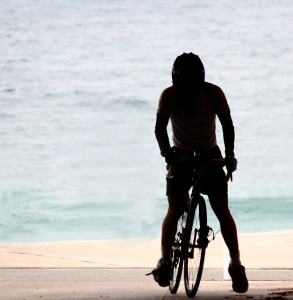Patellar Tendinitis and Cycling
 Typically a low-injury sport, cycling can still cause overuse injuries in elite athletes. These injuries are often due to improper cycling technique, but other factors, such as a lack of adequate stretching and muscular imbalance, can also play a part. One common injury among cyclists is patellar tendinitis, which is an inflammation of the tendon that connects the kneecap to the shin bone.
Typically a low-injury sport, cycling can still cause overuse injuries in elite athletes. These injuries are often due to improper cycling technique, but other factors, such as a lack of adequate stretching and muscular imbalance, can also play a part. One common injury among cyclists is patellar tendinitis, which is an inflammation of the tendon that connects the kneecap to the shin bone.
The Facts About Patellar Tendinitis
Patellar tendinitis is also called “jumper’s knee” because it typically manifests in athletes who do a lot of jumping, such as volleyball and basketball players. However, it is also a common cycling injury that can be caused by a seat that is too low or from using the big gears for long distances. Both of these scenarios can overwork the quadriceps muscles while the glutes are not worked as much as they should be. These imbalances can strain the patellar tendon and lead to pain in the knee. At first, this pain will only occur at the beginning of or after workouts, but it can progress to a point where it interferes with athletic performance and daily activities.
Preventing Patellar Tendinitis
Preventing this painful condition requires strong muscles and proper technique, whether you are cycling, running, or performing any other sports activities. When cycling, athletes can help prevent patellar tendinitis by varying their pedal cadence, especially when they do most of their riding in the big gears. Raising the seat can also help, as it pushes the athlete to utilize the hamstrings and gluteal muscles more, which lessens the strain on both the quads and the patellar tendon. Using a technique that incorporates more of the large muscles prevents overuse and fatigue of any one muscle group, lowering the risk of injury.
Our innovative RPM2 cycling footbeds can also help identify improper mechanics by measuring cadence, bilateral pressure, and power during a ride. Using the data obtained from the cycling app, high-performance athletes can make adjustments in technique to maintain proper balance with muscle use. To learn more about injury prevention, subscribe to our blog on the right hand side of this page and follow us on Facebook and Twitter.
Comments (0)
Write a comment
Rating: Bad Good
Enter the code in the box below: